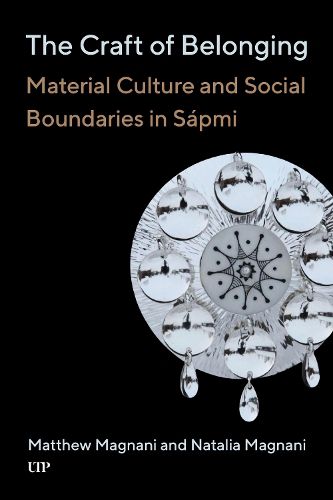Readings Newsletter
Become a Readings Member to make your shopping experience even easier.
Sign in or sign up for free!
You’re not far away from qualifying for FREE standard shipping within Australia
You’ve qualified for FREE standard shipping within Australia
The cart is loading…






The Craft of Belonging explores the role of craft and its mediation of social boundaries, particularly in communities that are under state pressure.Anthropologists Matthew Magnani and Natalia Magnani blend anthropology and archaeology to explore the role of craft in community-making from prehistory to present with the Smi, the Indigenous peoples of Northern Europe. Spmi, the Smi homeland, has sat at a material crossroads for millennia. Forests, tundras, and extended social networks offered raw materials autochthonous and imported. Wood, antler, cloth, and silver were crafted to cope with Arctic climates and state incursions. Integrating archaeological, ethnographic and Indigenous perspectives to reveal the transformative nature of material culture, The Craft of Belonging shows how long-term perspectives accentuate the shifting meanings and malleability of material social boundaries. Local agencies intersect with changing trade networks, colonialism and climate change, to resonate through the production, uses and signals of Smi craft (duodji). This book thus contends that ancestral material cultures, far from static cultural domains, are innovative sites of social transformation used to assert rights to land, water, and community belonging.
$9.00 standard shipping within Australia
FREE standard shipping within Australia for orders over $100.00
Express & International shipping calculated at checkout
The Craft of Belonging explores the role of craft and its mediation of social boundaries, particularly in communities that are under state pressure.Anthropologists Matthew Magnani and Natalia Magnani blend anthropology and archaeology to explore the role of craft in community-making from prehistory to present with the Smi, the Indigenous peoples of Northern Europe. Spmi, the Smi homeland, has sat at a material crossroads for millennia. Forests, tundras, and extended social networks offered raw materials autochthonous and imported. Wood, antler, cloth, and silver were crafted to cope with Arctic climates and state incursions. Integrating archaeological, ethnographic and Indigenous perspectives to reveal the transformative nature of material culture, The Craft of Belonging shows how long-term perspectives accentuate the shifting meanings and malleability of material social boundaries. Local agencies intersect with changing trade networks, colonialism and climate change, to resonate through the production, uses and signals of Smi craft (duodji). This book thus contends that ancestral material cultures, far from static cultural domains, are innovative sites of social transformation used to assert rights to land, water, and community belonging.